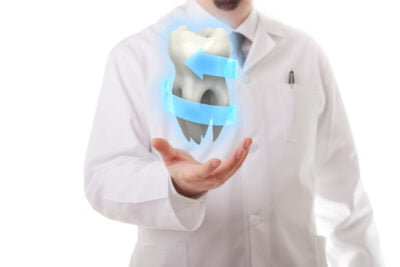 Chances are, when you go shopping for toothpaste you’ll notice most brands advertise “fluoride added”. But what exactly is fluoride?
Chances are, when you go shopping for toothpaste you’ll notice most brands advertise “fluoride added”. But what exactly is fluoride?
Fluoride is a naturally occurring mineral found in both fresh and salt water. It’s been proven to strengthen teeth and increase their resistance to decay. It aids in growing bones and developing teeth in children, and hardens enamel in both baby and adult teeth. Fluoride can even reverse early cavities!
How does it work?
Remineralization and Demineralization
Every day, your mouth goes through a series of processes called remineralization and demineralization. After you eat, acids in your food or drink contribute to demineralization, or dissolving, of the calcium and phosphorous that makes up the enamel matrix. At other times, when your mouth is less acidic, the opposite happens — calcium and phosphorous is restored in a process known as remineralization. During this process, the addition of fluoride makes the deposited minerals harder than usual. Teeth thus become stronger and more resistant to demineralization the next time.
Most toothpastes on the market contain fluoride because it is an effective, easy, and inexpensive way of preventing tooth decay. Many cities also add fluoride to their communities’ water supplies for this purpose (1 part per million is considered optimal).
Treating Teeth with Fluoride
Fluoride can be supplied to teeth directly through fluoridated toothpastes and mouth rinses. Your dentist can also apply fluoride by means of a gel, foam, or varnish. When a young person drinks fluoridated water, the fluoride travels throughout the body where it is eventually incorporated by developing teeth.
How Much Is Best?
You may be wondering: How much fluoride do I need? The right amount differs for every person. It’s influenced by factors including your body’s particular biochemistry, your diet, and your personal oral hygiene routine. A daily routine of brushing and flossing lowers your risk for decay (and in turn, the need for fluoride). So does avoiding sugary and acidic foods and beverages.
In contrast, poor oral hygiene and high intake of sweets create a breeding ground for bacteria, who need all that sugar to survive. As they digest sugar, they create a byproduct of acids that are harmful to your teeth. Certain drinks (like soda, sports and energy drinks, and even certain types of juice) are even worse, as they apply those acids directly to your teeth without the chance for bacteria to break them down. If your lifestyle includes a high intake of these types of fluids, your dentist may prescribe fluoride treatments together with a fluoride mouth rinse.
Is there such a thing as too much fluoride? Yes, especially when it comes to children. Enamel fluorosis is a condition resulting from fluoride overdose, which changes the appearance of the enamel and can range from spotting to severe staining and pitting. Although not dangerous, it may require cosmetic dental work to repair. Adults who absorb too much fluoride could develop skeletal fluorosis, which makes them prone to bone fractures or tenderness.
Ask your dentist at the Yuba City Dentistry Group how much fluoride is right for your family. He or she will be happy to answer any of your questions, and can even prescribe fluoride drops or tablets if there is not enough of the mineral in your drinking water.


